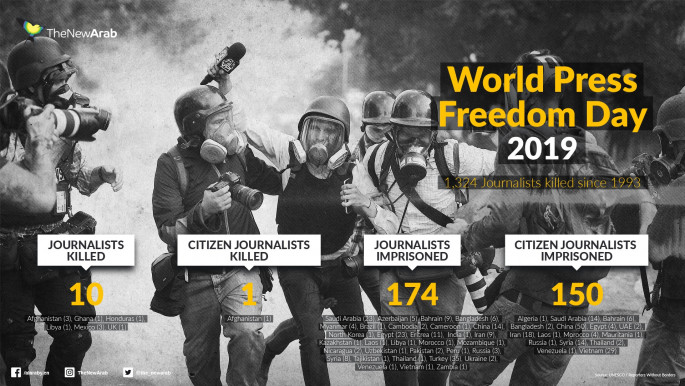World Press Freedom Day: Middle East still most dangerous region for journalists
"None of humankind's big problems – whether global warming, corruption or gender inequality – can be solved without information that is freely and independently reported and reliable, in other words, without quality journalism," RSF secretary-general Christophe Deloire said in a statement on the international Press Freedom Day.
"This situation is very worrying for journalists and above all for all those human beings who are being deprived of their right to information," he added.
Although many democracies, such as India and Mexico, scored worryingly in the RSF's World Press Freedom Index, it was unsurprisingly the Middle East and North Africa that ranked the lowest as a region.
Ever the glimmer of hope in a turbulent region, Tunisia has however climbed up the ranks since last year, rising 15 places to 97th in the world, after a year that saw an encouraging fall in violations.
However its neighbours in the region haven't followed suit. On Press Freedom Day, we round up the most dangerous countries to be a journalist in 2019.
 |
|
| [Click to enlarge] |
The chaotic and bloody fighting that has engulfed the country for the past eight years has not spared journalists, with the country coming 162th out of 180 in RSF's latest index. Mohamed Ben Khalifa, a 35-year-old freelance photographer and contributor to outlets such as The Associated Press, was killed during clashes south of Tripoli on January 19, 2019, while accompanying a UN-backed militia patrolling southern Tripoli.
In a heartening show of solidarity, protests condemning violence against journalists were held in Tripoli, Benghazi, Sabha and Zuwara, Ben Khalifa's hometown, in response to his untimely death.
In a worrying development, two TV reporters were allegedly kidnapped on May 2 amid heavy fighting in the capital, as observers say both sides of the conflict have begun targeting reporters to conceal the dire situation on the ground.
Syria
A second war-torn country, Syria ranks a lowly 174 out of 180 in the 2019 index. The tragic murder of revolutionary activist Raed Fares, on top of the dozens of other reporters still missing or thought to have died in detention, contributed to the score.
Fares, described as a "beacon of Syrian freedom", was killed by suspected Islamist gunmen in November 2018, seven years after he set up Radio Fresh, the first revolutionary radio station in liberated Syria.
Twitter Post
|
Egypt
Egypt, having fallen two places to 163rd, has detained dozens of journalists, many without trial, as President Sisi tightens his authoritarian grip on the country.
Egypt is also leading the uptick in journalists imprisoned on "false news" charges, with 19 cases in the past year, according to the Committee to Protect Journalists (CPJ).
The long-awaited release of photojournalist Mahmoud Abu Zeid, also known as Shawkan, has been bittersweet. The award-winning reporter, who was imprisoned after a post-revolutionary crackdown in 2013, is required to spend 12 hours a day in a police station for the next five years, as part of his parole programme.
Saudi Arabia
The gruesome killing of veteran reporter Jamal Khashoggi at the Saudi embassy in Istanbul sent shockwaves around the world in 2018. As well as brazen assassinations, Saudi Arabia is one of the world's worst jailers of journalists, according to CPJ.
At least 3 women journalists are in detention for covering women's rights issues, as part of a crackdown launched by Crown Prince Mohammed bin Salman since taking power in 2017.
"Saudi Arabia's extreme actions to silence critical journalists, even those who are not currently working, lend a cruel new meaning to the censorship term 'prior restraint',"said CPJ's Middle East and North Africa Program Coordinator Sherif Mansour, referring to the detention of the women.





 Follow the Middle East's top stories in English at The New Arab on Google News
Follow the Middle East's top stories in English at The New Arab on Google News


